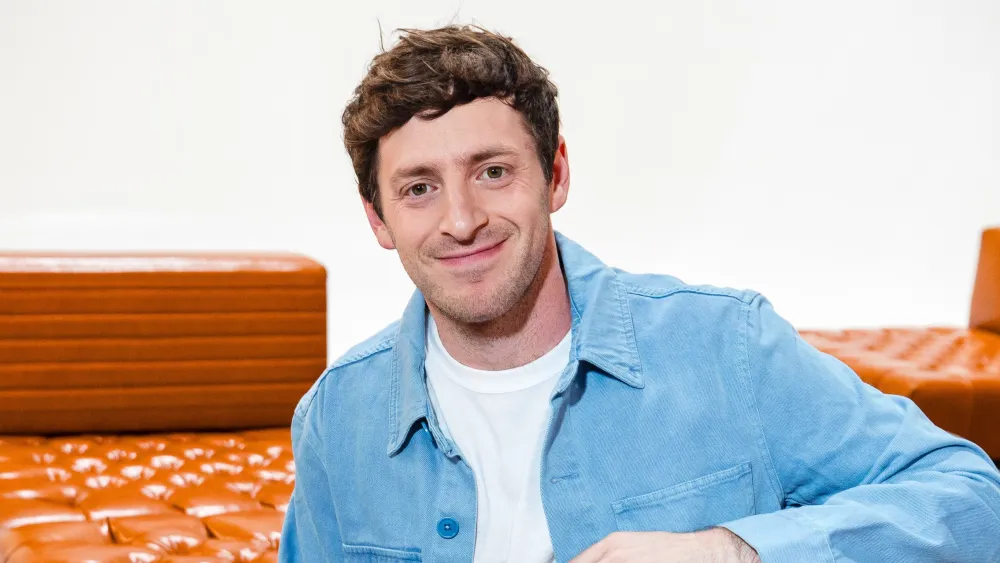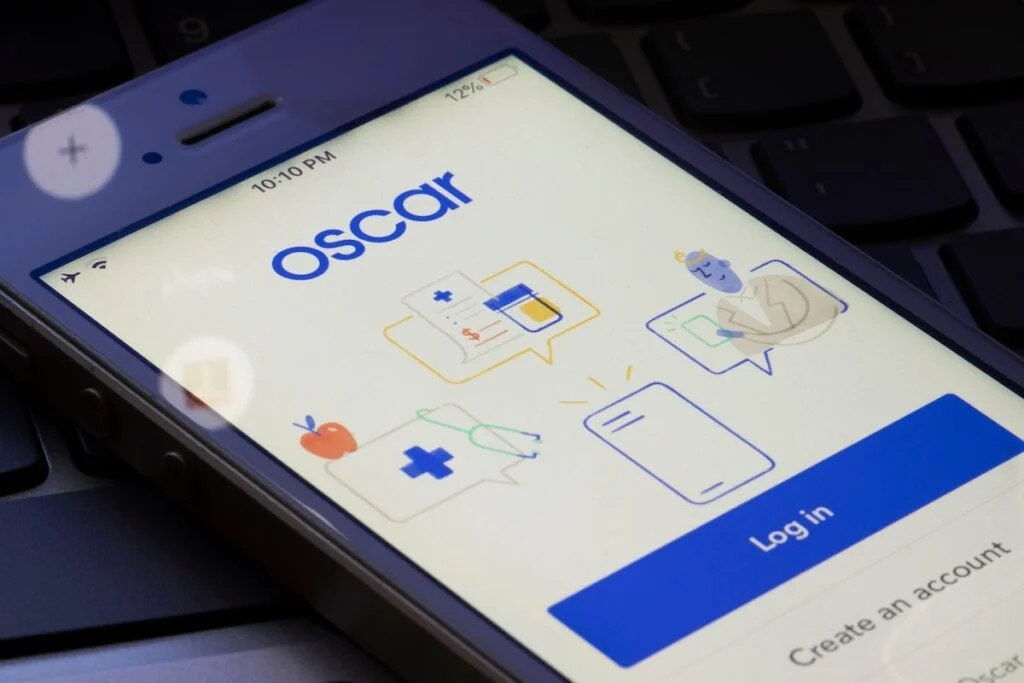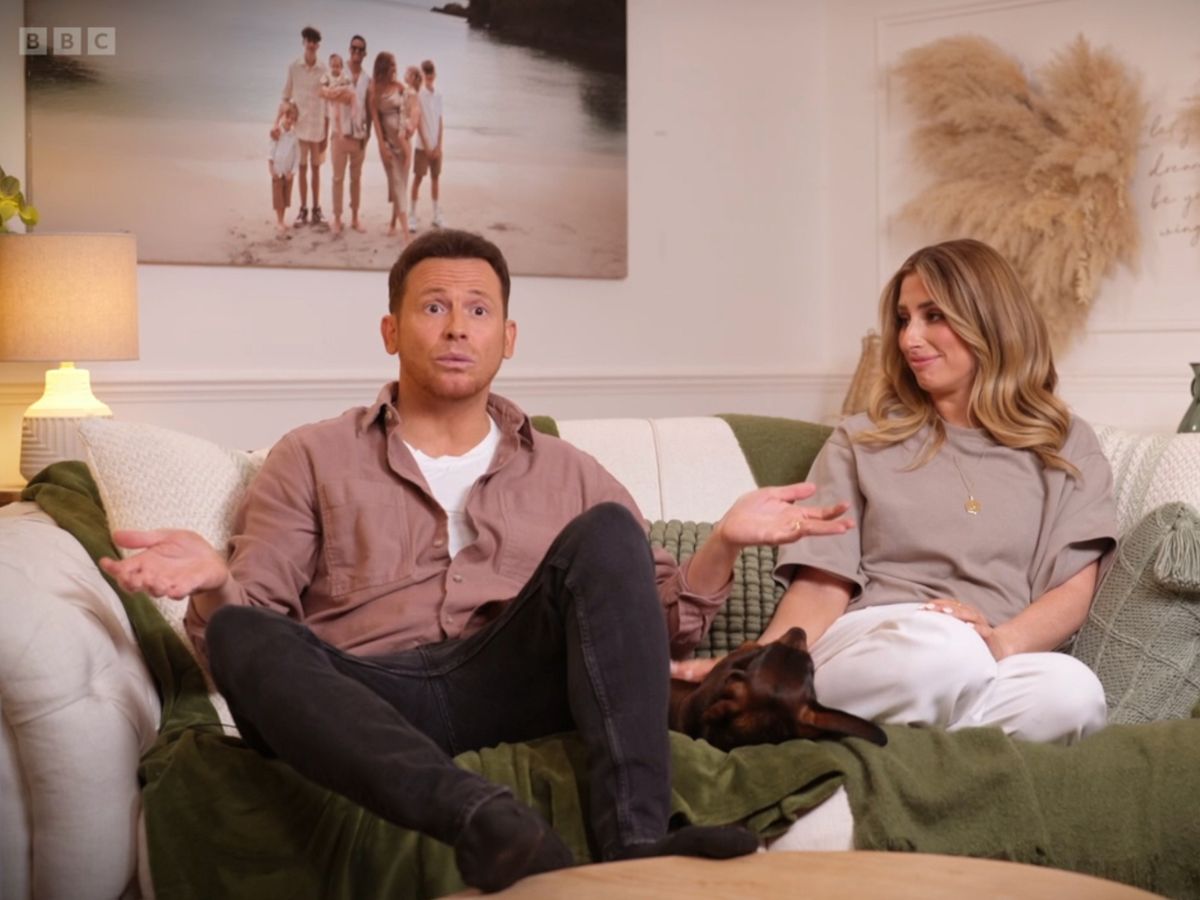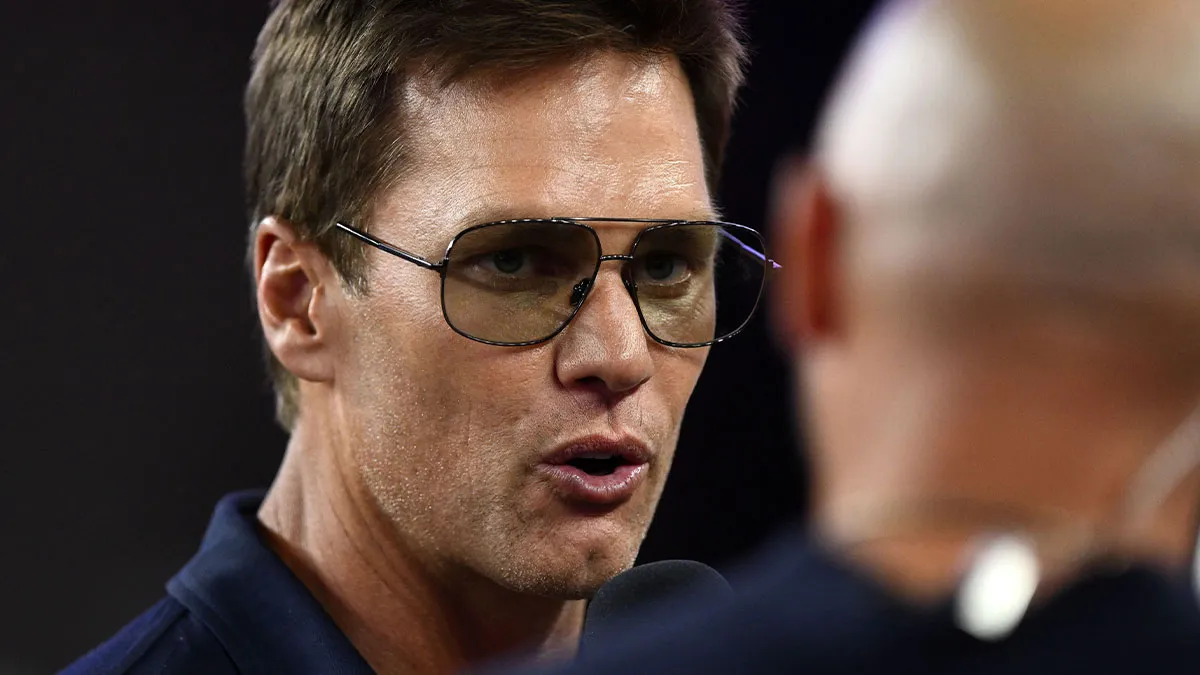
Alex Edelman makes me laugh before he even sits down at our lunch interview.
I arrive early to a noodle bar in Columbus Circle where I’ll ask the comedian about his upcoming stand-up hour and his role in Peacock’s “The Paper.” There are only a handful of people seated at the restaurant, but Edelman doesn’t want to take any chances. So, when he arrives, he looks around the half-empty eatery and, from the host’s stand, loudly calls out my name to the whole restaurant. I turn to face him, and, as if there was no other way to identify his dining companion, he says, “There you are.”
This spot is a favorite of Edelman’s, despite the fact that half the menu is dotted with symbols indicating pork and shellfish, two foods he can’t eat, he says in an exaggerated Talmudic twang, “Because Juuu-da-ism.” (Edelman is the Orthodox kind.) I order the shrimp buns, telling Edelman I’m a “bad Jew,” and he deadpans: “I’ve heard that about you.”
Edelman is a wunderkind of stand-up, known for blending the narrative style of British longform performance and the joke velocity of American club comedy. In 2014 he was named best newcomer at the Edinburgh Fringe festival, and 10 years later he won an Emmy and special Tony Award for his one-man show “Just for Us,” about his journey as an undercover Jew attending a neo-Nazi meeting in New York.
With “The Paper,” a loose spinoff of “The Office,” Edelman makes his first major foray into acting. His face, plastered on the side of buses and in subway stations, has stalked me on my daily commute for weeks. But it wasn’t the desire for exposure that drove Edelman to the workplace comedy. Rather, it was the workplace.
“It seemed really fun,” Edelman says of the series and the set. (He also serves as a writer on the sitcom.) “I use the word ‘fun’ a lot because it’s an important value in entertainment. It seems silly, but it’s a good metric for whether a show is all right.”
Last year, Edelman was asked to audition for the series, then labeled an “Untitled Greg Daniels and Michael Koman Project.” He received “dummy sides,” or fake scenes that would never end up in the show. But seeing the name Daniels, who adapted the British “Office” for an American audience, gave Edelman an “inkling” that “The Paper” might somehow be connected to Dunder Mifflin.
Still, “They’re totally different shows,” says Edelman. “Filmed” by the same documentary crew that captured the workplace antics in Scranton, “The Paper” follows the staff of a struggling Ohio newspaper just as an eager new editor-in-chief arrives. “Our show is a little more ‘Parks and Rec’ than ‘The Office,’ in my opinion. There’s a spirit of optimism to Ned Sampson that’s closer to Leslie Knope than it is to Michael Scott,” Edelman says, referring to Domhnall Gleeson’s starry-eyed boss character.
Edelman plays Adam Cooper, a quiet and awkward accountant turned reporter who has the gift of making every conversation an exercise in patience. His wife packs his lunchbox every day, complete with a dinosaur sippy cup, and he eats his jello cup with a napkin tucked into his shirt collar. I tell Edelman his character is nothing like him. “He’s dumb,” Edelman says, leaning across the table. “You want to say he’s dumb.”
“Gbemisola Ikumelo [who plays Adelola] sits next to me in the office, and she developed her character as sort of a brassy burnout, like too cool for school,” Edelman adds. “I thought, ‘What would be the most fucking annoying thing for her character to sit next to?’ It’d be a dopey golden retriever.”
Unlike Adam, Edelman will talk your ear off, his big brown eyes bouncing off the walls as his hands fidget with a napkin. He’s hyperfixated on the conversation but has no problem steering it in three directions at once.
An early tangent leads us on a 12-minute detour talking about Bob Dylan. Then Edelman’s phone rings, interrupting his thoughts about the 1998 Grammys. “This is my best friend,” he says, and he picks up: “Hey, I’m in the middle of an interview, then I’ll call you back. But what year did we go see Bob Dylan at the Beacon?” Suddenly, our interview is a folk-rock conference call.
When he hangs up, I ask Edelman what it was like to work in a writers’ room after years of touring a solo show. “My process has always been compromise-focused,” he says. ”Compromise is the wrong word. Conversation is the right one.”
Edelman says some of the best lines in “Just for Us” were workshopped or suggested by other comedians. (“When I say ‘other comedians,’ I mean mostly Mike Birbiglia.”) And the show felt more like a dialogue than a diatribe. While touring the special, Edelman dealt with hecklers and haters, but mostly audience members who wanted to share with the comedian their experiences with assimilation, Judaism and antisemitism.
“I talked to audience members after every single performance of ‘Just for Us,’” Edelman says. “I was outside after every single show — 500 of them.” He still gets teased about the length of the “Special Thanks” section of the special, which boasts eight full pages of names in small font.
“There’s a misconception that solo shows are solo efforts,” says Edelman. He takes a breath before mentioning Adam Brace, his close friend and collaborator on “Just for Us” who directed the one-man show and helped bring it to the global stage. Brace died unexpectedly at age 43, one month before “Just for Us” debuted on Broadway.
“The reason ‘Just for Us’ came to an end wasn’t that it reached a logical stopping point — it could have continued commercially. I just couldn’t do it anymore,” Edelman says. “If I’m being totally honest, the dialogue around it became unbearable for me. It just reminded me that Adam wasn’t there, and it was harder to have those conversations with strangers.”
Now, Edelman is working on a new comedy hour, tentatively titled “What Are You Going to Do.” He’ll bring the new act to New York’s Carnegie Hall in November.
“There’s a little bit about Israel and Palestine, a lot of stuff about my family, a lot of stuff about the appeal of Jesus,” Edelman teases. While talking about the Middle East on-stage is a tightrope not many wish to walk, Edelman enjoys the challenge. “There’s always a way to navigate complicated stuff,” he says.
He recalls being approached by an audience member after a performance of “Just for Us” who took issue with a joke Edelman tells about the Holocaust. “Some things are too important not to joke about,” he says, stabbing at his noodles with chopsticks. “This idea that you belittle something by including it in a comedy show is a totally foreign notion to me.”
Edelman has a lot on his plate. He’s set to write and direct a movie produced by Marc Platt (“Wicked”) based on the Christmas story from “Just for Us.” He’s currently teaching at an MFA program in New York. He’s “eager” to pursue “utterly fictional stand-up, about a person’s life experience that’s not my own.” And he’s venturing more into acting, having just shot a small part in a movie with Jake Lacy and AnnaSophia Robb.
There’s also, of course, the early renewal of “The Paper,” but Edelman remains coy about Season 2. “I want to avoid spoilers, but I like where we leave off,” he says.
“There’s a misconception that watching people try, or watching people be good at something, is not funny. I like that they’re getting good,” he adds, referencing the surprise success of the newspaper staff. “I think it’s a really weird and cool direction for a show about a group of misfits — they actually get good at things.”
Edelman has no plans to step away from stand-up comedy, but his experience on “The Paper” has pushed him in other, more collaborative directions, too.
“Part of the reason I wanted to join the cast of ‘The Paper’ was after five years as a solo animal, it’s just nice to be part of a family,” he says. He didn’t realize how much he craved the compromise — or, rather, the conversation — of an ensemble. The joys and occasional frustrations of being in the company of others.
It’s the same human longing that drew viewers to shows like “The Paper” in the first place, and perhaps why its predecessor “The Office” was the most-streamed series of 2020, the year of social isolation.
“Hell is other people,” Edelman says, parroting the famous Jean-Paul Sartre quote. He adds an addendum: “But, like, it’s so much better than being by yourself.”



